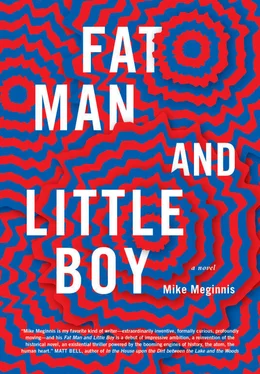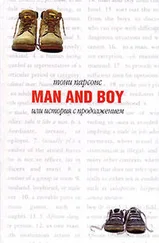Little Boy begins to drool on the table.
“I know it’s not just the girl. You won’t say it but I can tell what’s going on in your head, at least some of the time.” He goes on, in his meant-to-be-educational household mixture of English and French, describing what he imagines his brother keeps balled up in his mind like a fist: the memory of the Japanese family, the babies, the piglets, the fires, their trees; the times they’ve run, the entropy or growth that touches everything they touch—the little fires that light on every wick they handle, hungry maggots; their poverty, their loneliness, each other; the way the fat man hits him; the bed they share and the chill that makes them hold each other underneath the blankets; Fat Man’s secrets—his cabin hidey-hole, his run of the grounds.
There is also the matter of Little Boy’s wage as a hotel employee, which he earns by small tasks and regular cleaning of the communal areas, their own cabin, and Rosie’s. Outraged by his brother’s squandering of money on candies and toys, Fat Man asked Rosie to entrust him with Little Boy’s wage to save or spend on his behalf. With their earnings they can feed themselves if that’s all they do, and put a little aside for illness and new shoes. Her argument is that since she lodges them they do not want. Little Boy does not indicate by any quiver or angle of his chin that he understands the budget. Sometimes he tries to wheedle sweets. So far no such luck.
The last straw was Fat Man’s agreement, as his Uncle John, that Little Boy should go to school next year, where he will learn French and times tables, little gleanings of natural science, and they will train his handwriting.
Fat Man has grown increasingly concerned about what will happen if Little Boy goes to school. It has also occurred to him that girls of Little Boy’s purported age can sometimes bear children, and that it would be wrong and dangerous to inflict this on them. He has tried to speak to Rosie of school again, but there is no reasonable explanation that he can share with her for why his brother shouldn’t go. He has tried to tell her what a strange boy his nephew Matthew is, how little he speaks, how nervous he has become since his parents’ death, but she refuses to draw the natural conclusion: school can wait.
School, then, for Little Boy, or they must go hungry again. Surely Rosie would not employ an uncle who neglects his nephew’s education. As for the threat of pregnancy, that will need a solution.
“I know it’s been rough,” says Fat Man. “I know how hard you worked to find me. I know you get lonely, though I am still your brother, and though I am still here for you. But I need you to help me so we won’t get in trouble. I need you to be a little boy, not a baby. I need you to help me make money, and save, so we can take care of ourselves. We need to get some guests for the hotel, or we’re going to be in trouble. We won’t be able to keep guests if you act like this. It’s going to creep them out.”
Little Boy drools on the table.
Fat Man says that’s exactly what he means. He says, “I’m not going to tuck you in tonight,” though they both know he will when it gets cold. They both know that before long he will undress Little Boy and put him in his pajamas. They both know that he will roll up Little Boy in the sheets and the blanket, and himself, and he will hold his brother.
Little Boy is being a baby. This is his second time. The first time, he was in a shell. It was like an egg. They built him in New Mexico, built him special, and they were very careful, which is different from how most babies happen. Most of the time people make the baby and they don’t know what it is—who the baby will be—for ten, maybe twenty years after. It wasn’t like that with him. They knew what they were getting. The question was how much. There was the small chance—about two percent, they estimated—he would incinerate the atmosphere. Or would be a dud. But most likely there would be a terrible explosion, which could have different effects depending on where it happened, meaning civilian deaths or military deaths, infrastructure destroyed or machinery, factories or weapons, planes, etc. He would be defined in terms of what he exploded, and they could decide that too with some confidence. American bombers had a lot of practice. Little Boy, if asked by his brother, would say he does not remember this time. So would Fat Man, though with less vehemence.
So there he was in his shell, more or less defined, only waiting to come out and be. They liked to touch him. They moved him around. He didn’t have any way of feeling or hearing any of this through his shell. But he unfelt them. He unheard them. The shadows of their touch, the negations of their voices. He didn’t understand what they said, precisely, but there were many languages, soft voices, harsh voices. They laughed nervous laughs. They whispered.
He was clenched the whole time. Cold. Waiting to explode. Not wanting it, not precisely, only knowing or feeling, or unknowing and unfeeling, that he would, wherever whenever they dropped him.
Now, the second time he is a baby, his name is Matthew. Fat Man gets used to it after the first month. Sometimes he forgets the Little Boy baby’s around. He starts talking to himself the way they did when Little Boy was a baby the first time, only now he can hear it with his ears, which are a part of his new shell—the little boy shell with its little boy ears. Fat Man will say things like, “God I’m tremendous,” or, “I think I’m growing again.” He stands in the middle of the room holding his flab out in front of him like pulling balls of dough from a loaf’s worth. He looks at himself that way for a long time. After a while he puts his clothes back on and leaves to work. Little Boy won’t move until Fat Man comes back. Or, if he does move, Little Boy will still move back into the same place before Fat Man comes back, so it’s like he never moved. Fat Man comes back stinking from work, or with new books under his arms, borrowed from the widow’s library, or with bread and milk for Little Boy, and wedges of melon, or a half-dozen eggs.
One day Fat Man puts a grape in Little Boy’s mouth, but Little Boy stops chewing halfway through. The chewing is too much to ask. Little Boy is so tired, all the time tired. He is sad about this girl, or maybe all the girls. So he’s working his jaw and it feels like a rusty gate, about as heavy, and so halfway through he gives up. It goes partway down his throat, gets caught there, and at first Fat Man doesn’t realize—he thinks Little Boy swallowed—so he puts another one inside. It rolls down Little Boy’s tongue and sticks in his throat on top of the other.
Fat Man figures it out when Little Boy turns blue. Fat Man flails, shouts, “What in hell are you doing?” In his panic he squeezes Little Boy’s throat, crushing the grapes so they go down.
The next day Little Boy has six bruises around his neck shaped like Fat Man’s fingers. They feel tremendous. Fat Man resolves to mash up everything he feeds Little Boy or to cut it up small. He softens Little Boy’s bread in milk or water. He works Little Boy’s mouth to make him chew, and shoves the food down his throat with a finger if he has to. By the summer’s end he has Little Boy on a mostly liquid diet consisting of water, milk, broth, and the things he can dissolve inside them.
Little Boy’s favorite thing is to lie back on his chair, almost but not quite falling out, mouth open, and wait for Fat Man to pour his dinner down inside him, where it glows in his belly. Glows, and seems to grow.
Fat Man kisses him sometimes on his head after a meal, if he thinks Little Boy has tried to be less difficult. But Little Boy never tries. He doesn’t want to make things easy. If his body falls into such a position as facilitates the meal, then he will let it stay there. If he won’t make it better then he can’t make it worse. This is one of the rules.
Читать дальше












